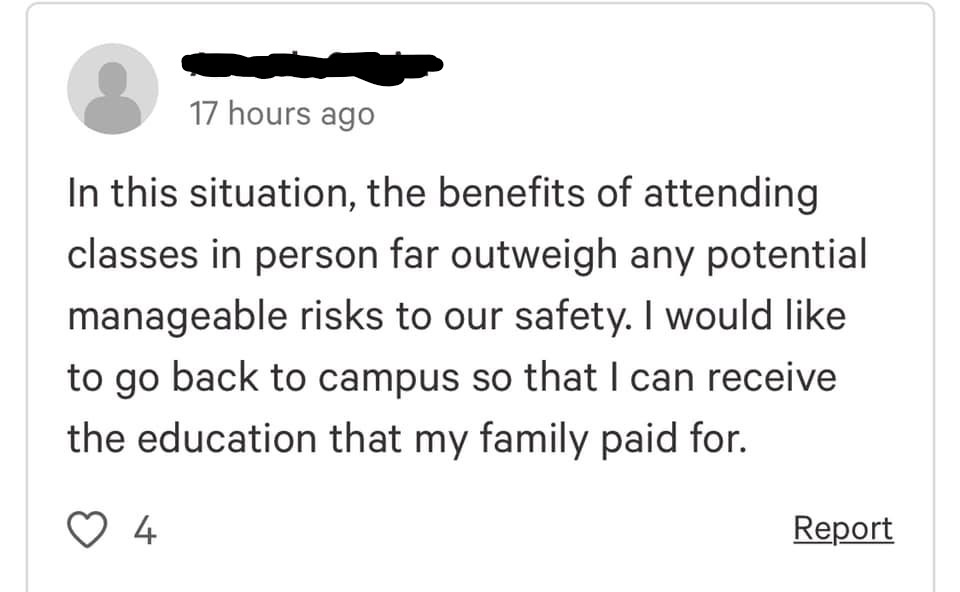Well, these readings hit a lot closer to home this week than any of us expected.
I’ve never had to take a class fully online. And yet, for the next month and a half or so, I’m going to have to get a lot more comfortable with using technology in all of my courses. I’ve certainly used my laptop in the past to do research, but outside of the projects I’m working on for this class and using Google Docs to collaborate on projects last semester, it’s rarely gone deeper than that. I’m not too concerned about myself, though – most of my courses will be using Zoom to do class meetings, and most of our assignments can be submitted online. But I was concerned about the impact this might have on undergraduates’ education.
If my undergraduate institution is any indication, undergrads are concerned about that as well. A friend of mine made a Facebook post showing comments from students who didn’t want to leave campus and move to online courses. While the broader point of the post was to show the entitlement of a select few students (and it does – I’m not linking to the post because the way that some students put themselves before the health and safety of others is frankly disgusting to me), I thought that this particular comment was relevant to our readings this week:

Ignoring the selfishness here, I think this demonstrates a lot of students’ feelings about taking courses online; it is an inferior educational experience to having in-person classes. I wonder: is this true, or is it just what we’ve been taught to think?
This article on learning management systems claims that while LMS can be a great tool for students, it should only serve as a compliment to in-class instruction. The same website also asked students about their learning preferences with regards to online courses, and provided data showing that students generally prefer in-person classes. However, when looking at the “BA Public” section (which I would assume has the highest number of online students, though I may be wrong), more students are open to the idea of mostly or fully online courses. Does this mean that students who actually take online courses enjoy the experience, and don’t see a noticeable change in learning when compared to in-person-class students? I don’t know. If anyone can find data on this, I’d love to see it.
Of course I recognize that online learning has its drawbacks. I was saddened but not surprised when reading this book chapter about Wikipedia and Women’s History, which details how hard it can be to include women in Wikipedia articles due to the biases of those who edit Wikipedia. As I read through, I became more and more discouraged about the possibility of an open-source website like Wikipedia to be truly inclusive. But wait! I thought to myself, “This class project was done in 2011, and the book was published in 2013! Surely things have changed in seven years!” Things have not changed. I don’t know what the solution is, but we first need to acknowledge that this is a serious issue with very dangerous ramifications for digital learning.
4 replies on “Learning Online in the Age of Coronavirus”
You made a good point about online education and the value of it.
I think that the technology creates an artificial distance between the student and teacher in these cases. Also, there is less of a mentality about doing schoolwork online, as opposed to in person with a teacher. There’s less of a divide between school and free time, as opposed to getting up and going to class.
On the other hand, the technology is being widely used in small ways in class, and this will continue to grow over time. Like the online grades, quizzes and tests, as well as posting readings online, as opposed to a textbook.
I took online classes when I was an undergrad, and I enjoyed them. I have taken History, English, social work, statistics, and CPR/first aid classes online. Discussions were more difficult to have with online classes, but with discussion forums it is still possible to have discussions. Students do have to be wary of discussions shifting to online trolling. I have experienced students making comments in online forums they would not make in the classroom. I think it will be important for students to resist the urge to behave in a troll-like fashion. Professors need to moderate so that discourse is allowed and encouraged but does not transition to personal attacks. Moving completely online for all classes will have an impact though because some students who do not have much social interaction outside of classes will lose that, which is why in the future I would not recommend going fully online for all classes.
This readings did come at an ironic time, Jeff. I certainly am having trouble transitioning to an online setting. However, I think this is due to what I am missing in person-to-person interaction, rather than an inability to communicate. I am certainly thankful for technology in a time like this, but online forums and assignments just do not capture the seminar discussion I thrive on. I hope we could maybe incorporate Zoom at some point – I think it would be great to see everyone and keep some human interaction going!
Jeff, I agree that this period will be trying for students. I personally have had to adjust to all my classes going online. The biggest struggle for me however is keeping all my assignments straight and trying to not forget to do one. I could see this being a major challenge for undergraduates since some are not used to heavy workloads yet.